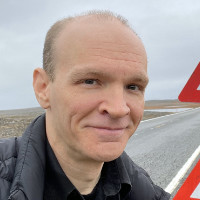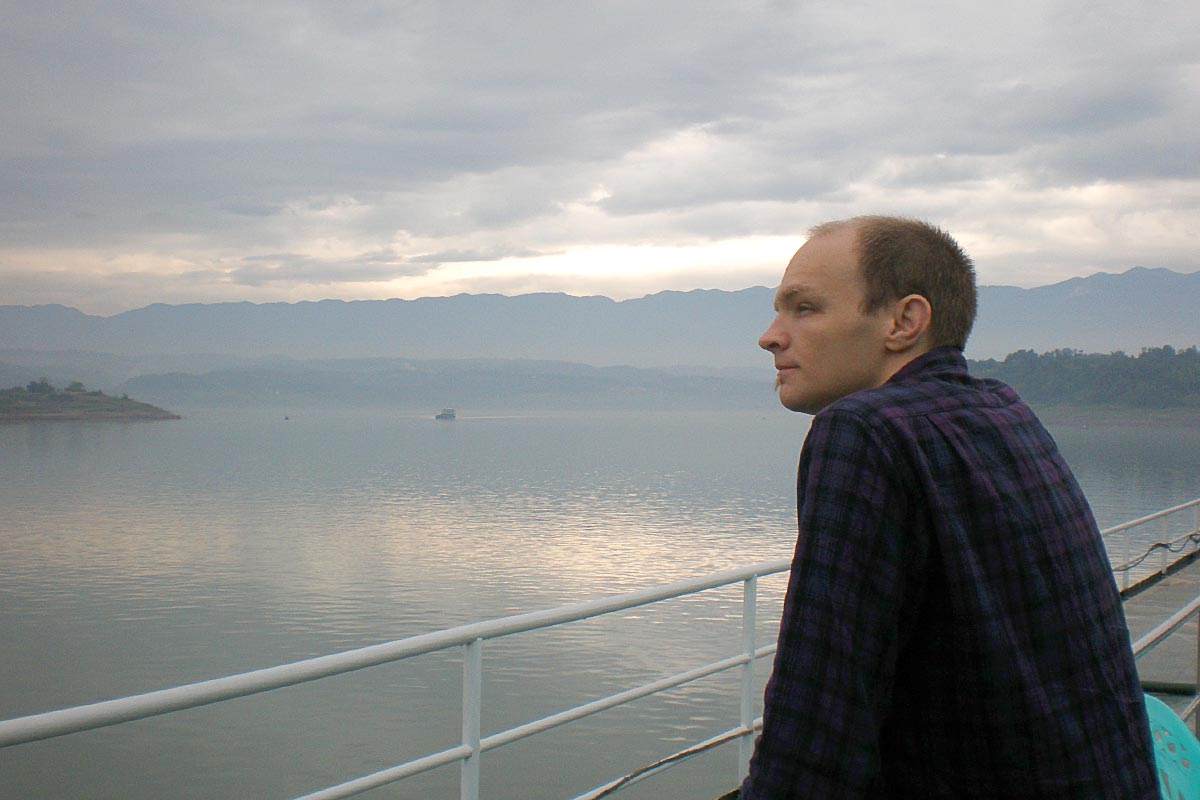
I don't know how it happened
But the riverboat captain
He knows my fate
—Bob Dylan
The legendary Yangtze River (长江 or “Long River”, actually called Chang Jiang in Chinese) begins in the high and wild Qinghai Plateau in western China, flowing almost 4,000 miles to Shanghai and emptying into the East China Sea. On my trip around China, of course I had to see it. I had all my insulin and blood sugar testing stuff with me – time to hit the river for a three-day cruise!
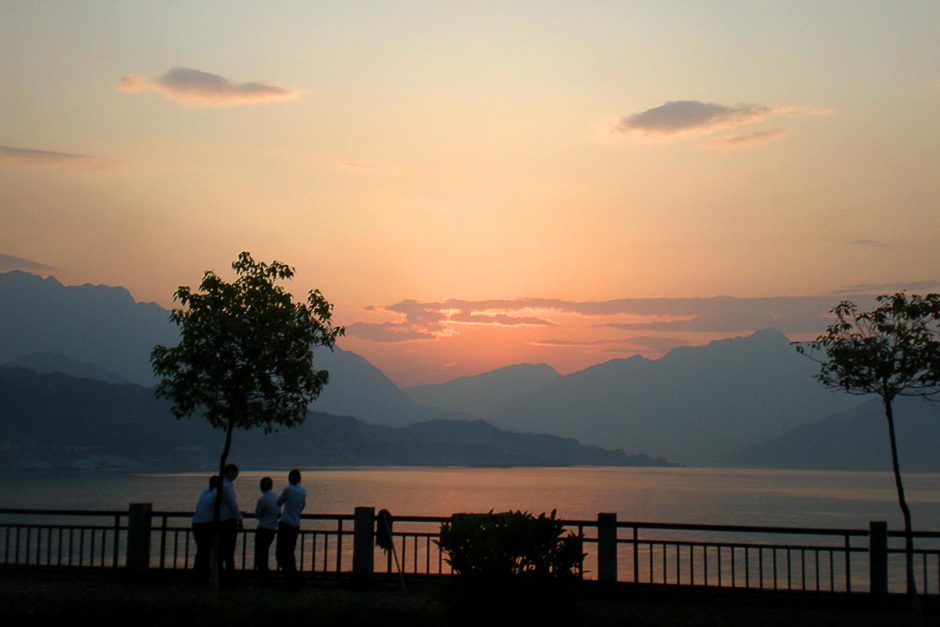
Sunset on the Yangtze, in Yichang, China.
Actually, my travel partner Masayo and I approached this cruise like we do everything else: by trying to avoid bland “package tours” as much as possible. This hadn’t worked so well recently when we went to the UNESCO tulou houses of southern China and ended up stranded on a mountain road where there was no public transportation and no hotels or shops, but we met some Taiwanese travelers who helped us out, and it turned out to be one of the nicer experiences we’ve had.
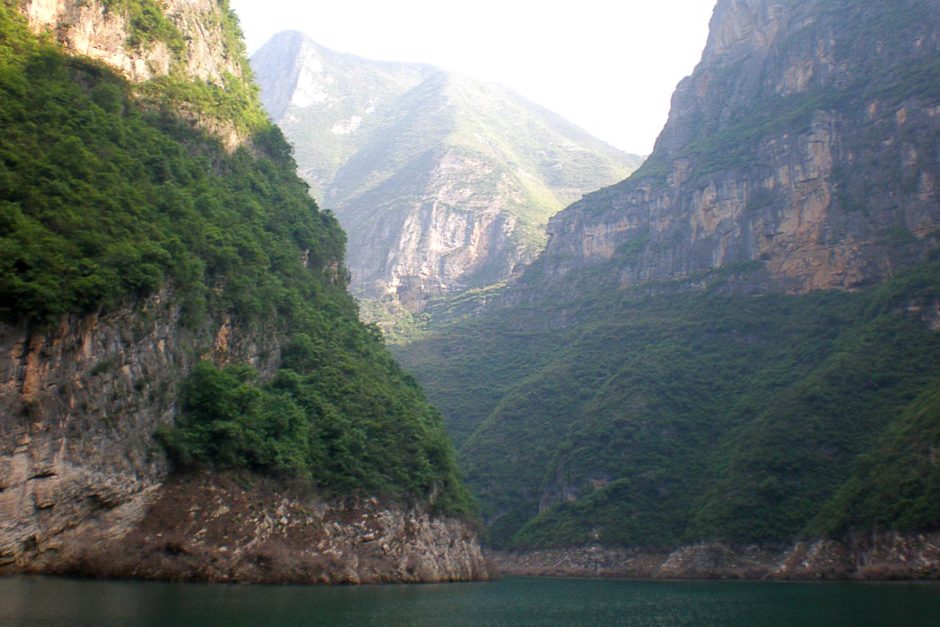
But when it came time to take a Yangtze River cruise, we didn’t want any nonsense. Just space on a boat that was going up the river. You can keep the visits to souvenir shops and tacky on-board entertainment. At our hostel in Wuhan, we looked for the cheapest tour we could find – saving money means traveling longer for people like us.
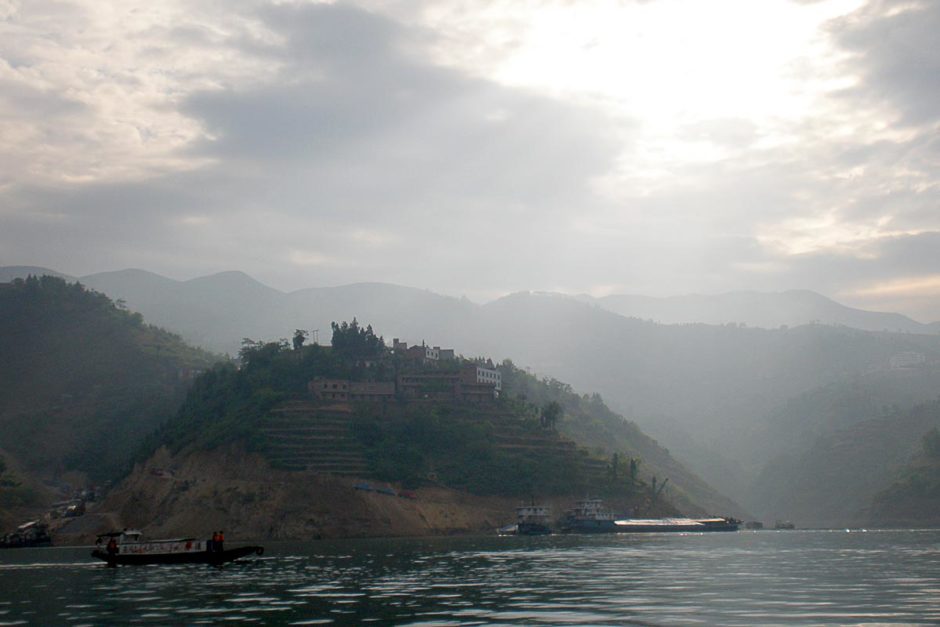
We found one that seemed a good deal – three nights on a boat from Yichang all the way west to Chongqing. We signed up and headed for Yichang the next day.
Once there, though, we had no idea where to go. We had an address but it was just a little street with some trees and shops on it. As we strolled down the sidewalk, one doorway had a girl in it. For sale – a prostitute. Although I was with Masayo and we had our bags with us, the girl waved to me and asked (in so many words) if I was interested. Hoping against hope.
Eventually we found the travel desk, and stressed to the staff that we wanted space on a boat – not a tour, per se, just conveyance up the river. We were trying to save money, and didn’t want to be guided around anyway. But, it turns out there was no such thing. We had signed up for a tour, because that’s all there was. We paid our 1600 yuan (about $250) and got on the minibus with everyone else to the starting point, Yichang International Hotel.
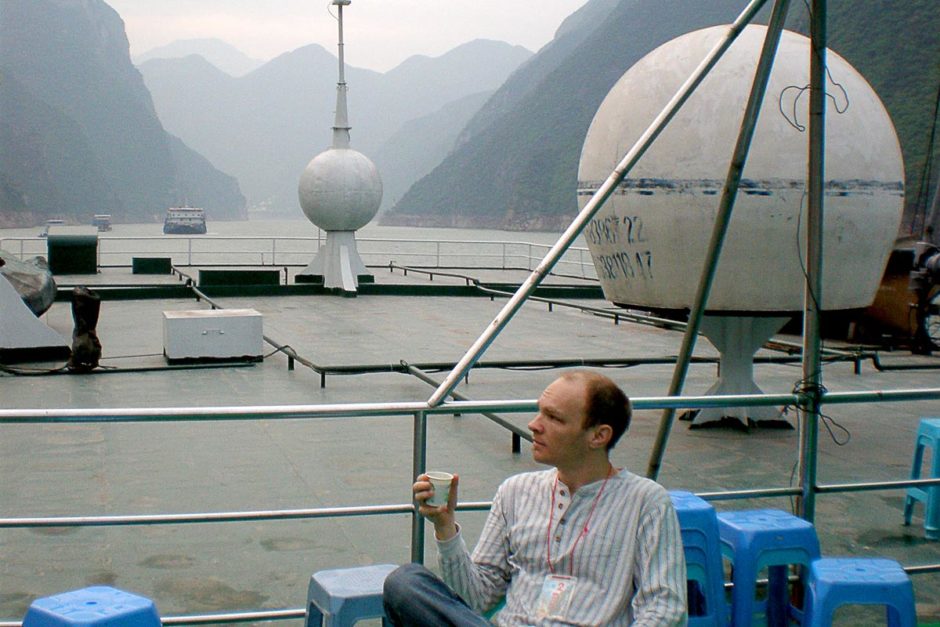
6:00 am on the Yangtze. Could cheap coffee be any more delicious?
We would find out over the next few days that nobody spoke English on this cruise; most foreigners sign up with other companies who have English-speaking guides; and it was very unusual for us to be there.
But the boat – an old vessel called 长江现光2, was just our size and had the feel we like. Raggedy and functional.
And indeed, Masayo and I were the only non-Chinese on the small ship; we roomed with two other couples, six to a room with tiny bunk beds and minuscule shared showers. The others were older and got up very, very early, being noisy and waking us up in the process. Then when we got up we had the facilities to ourselves, so that was nice I guess.
Diabetes report – Insulin on the Yangtze
Food on board the boat for these four days was not too different from food in the rest of China. Instant noodles were available, which we knew well. Our favorite sugary-yogurt drinks were also on sale. These things were high in carbs, but the carbs were at least printed on the packaging. As usual, I tried to drink half a bottle at a time – an entire bottle was 60 grams of carbs.
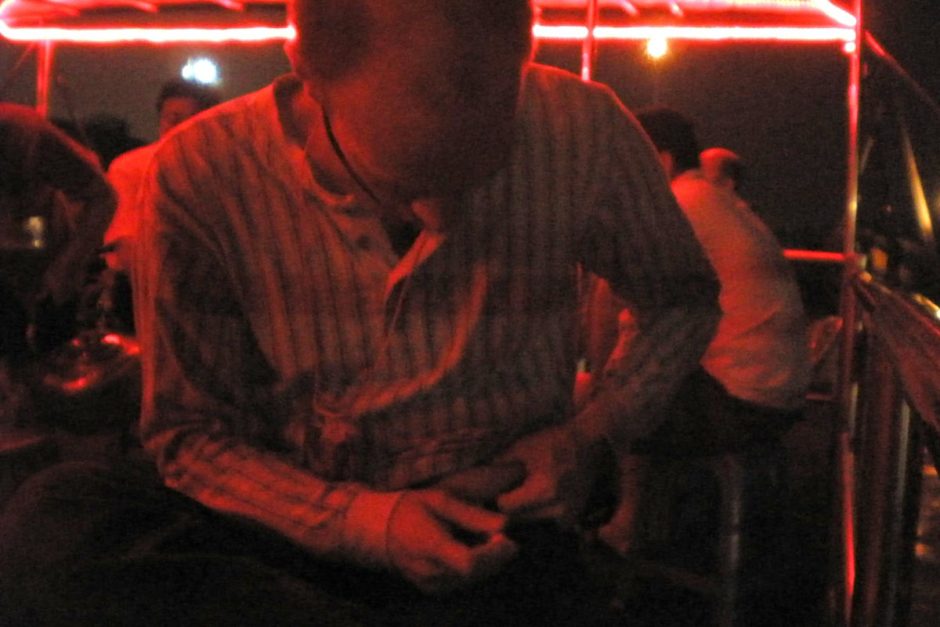
Discreet insulin shot on the top deck of the Yangtze boat.
When we left the boat for an excursion, I always took a supply of insulin, blood sugar testing supplies, and low blood sugar snacks in a little shoulder bag with me. (Low blood sugar snacks were for sale in the boat’s store.)
It’s important to always carry things like this with you, even if it’s a short time. There isn’t really anywhere you can’t go with diabetes as long as you prepare a little. Your memories of a majestic and complex place like the Yangtze River can be made up of beauty and adventure, not diabetes.
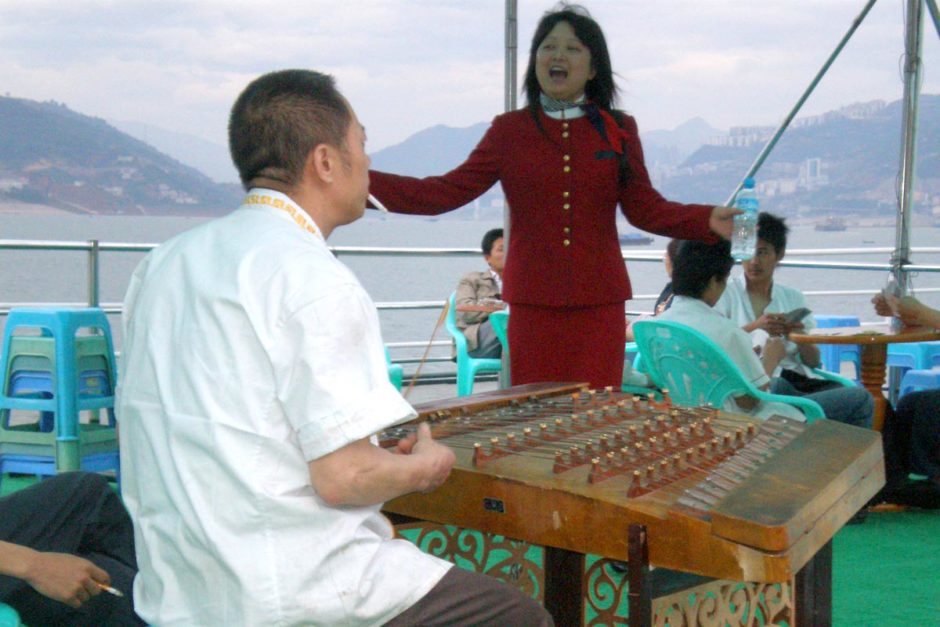
The boat we were on was a white vessel with bunk rooms on the first floor, a lounge and a small shop on the second floor, and a top deck on which were several cheap plastic turquoise chairs. We fell into a routine of having coffee on the top (there were always plenty of empty chairs for us) in the morning, waking up to the slow passing of green, misty hills.
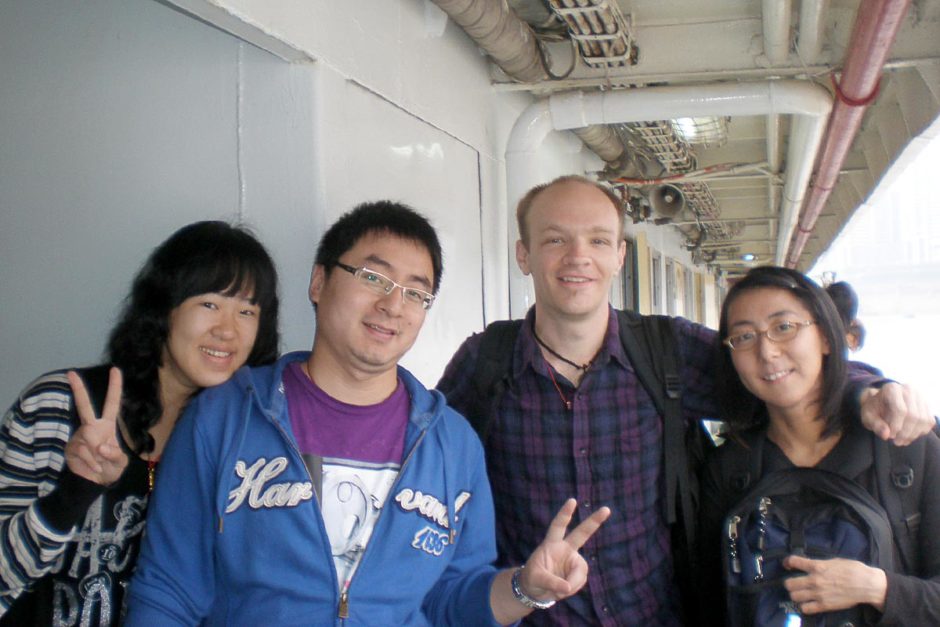
Lunch was usually instant noodles from the shop, then the afternoon was again sitting and admiring. (Sometimes we got off the boat for some touristy stop at a temple or something, but is was always interesting.) Dinner was on deck, ordered from a menu. They put lights on the boat and even had people giving traditional and rather informal music performances.
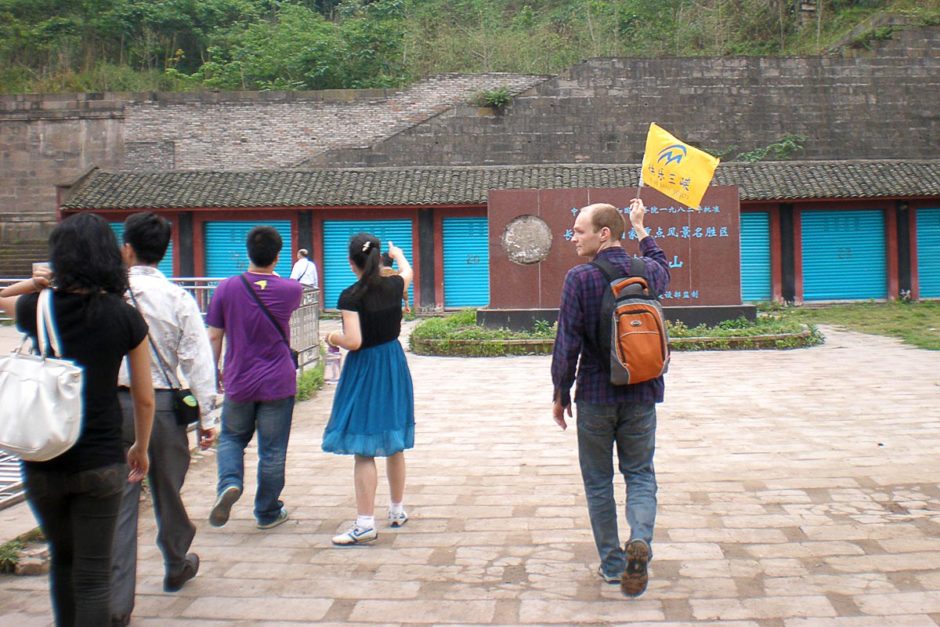
Little Three Gorges side tour
But it wasn’t all just sitting on a boat. One afternoon in Wushan we got off onto a smaller speedboat and went up the Daning River through the so-called Little Three Gorges. We then moved to even smaller boats; wooden paddled boats with curved roofs. They didn’t look safe, but sometimes you just have to go with the flow.
It was here that we saw other boats like ours but full of Western tourists. They all had orange life jackets. Masayo and I felt proud of ourselves, with a local little tour that only had Chinese tourists, no English instructions, and not even enough life jackets for all of us. This was when we finally realized once and for all that we had signed up for an unusual tour for non-Chinese like us.
The views were amazing here in the smaller, narrower gorges. As monkeys climbed around above us we headed to a small temple carved into the rock face.
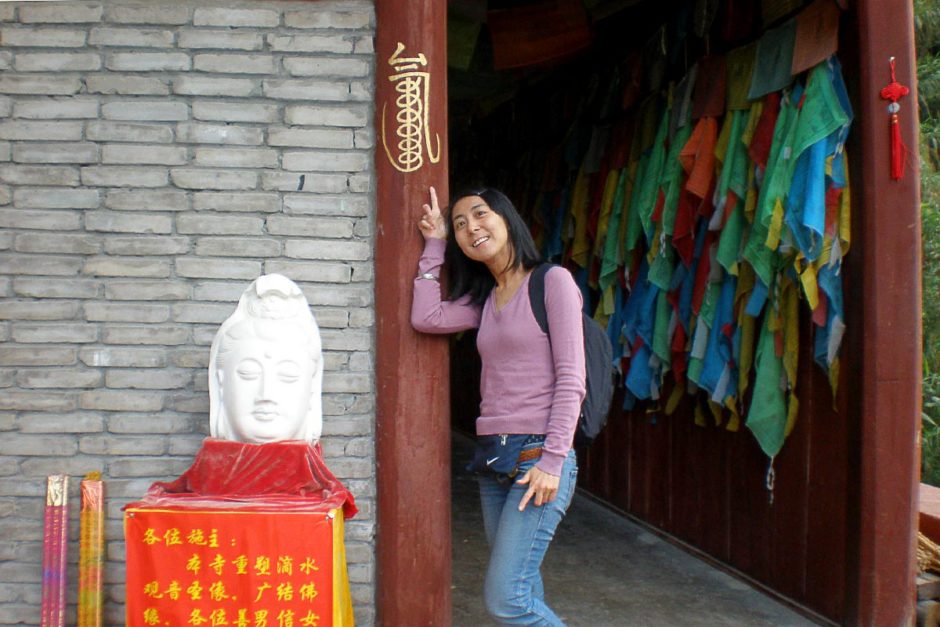
Prayer flags lined a short hallway that led to the inner area, and we were encouraged to approach a statue holding a vase, out of which real water was pouring. Visitors dip their hands in the water and throw money (many threw bills) into the pool at her feet.
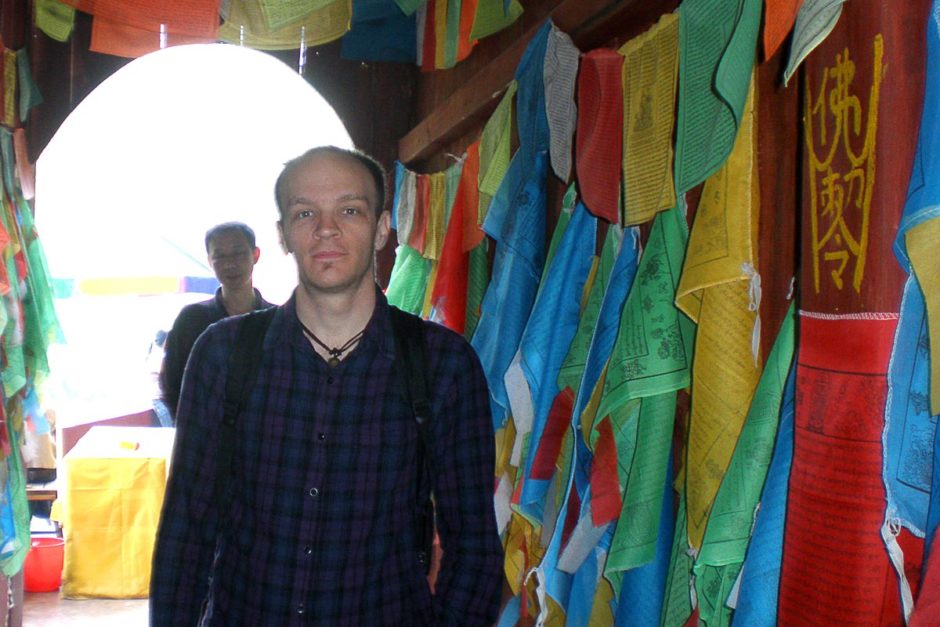
Masayo and I dipped our hands but declined to throw away good money.
Michael Palin and I in Wushan
Occasionally on ones world travels, he or she crosses paths with Michael Palin.
I first heard of the city of Wushan (巫山) in Michael’s excellent 1997 series Full Circle, when he took the same tour as we took this year: Yangtze River from Yichang to Chongqing. He disembarked and walked the streets of the city, getting a shampoo at a local hairdresser for some reason.
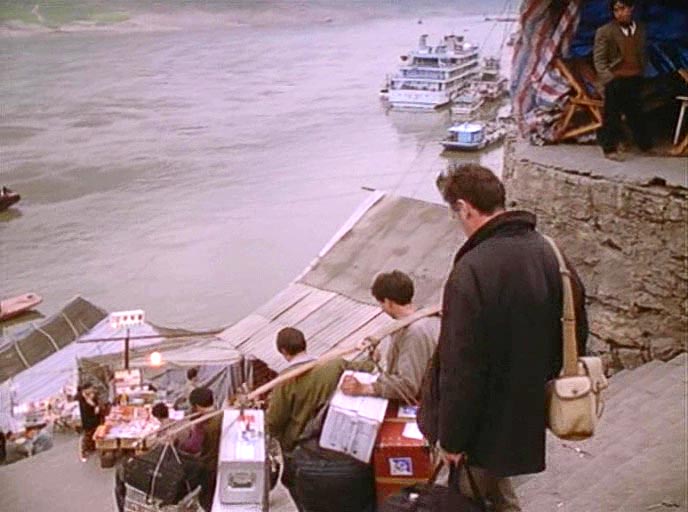
Michael Palin follows porters back down to his Yangtze boat in Wushan, China.
So I got excited and took a photo of the edge of Wushan, which I knew appeared in Full Circle. Things seem to have changed since then: the riverbank is now a huge slab of concrete, whereas when Palin was here it was dirt and coal. The long stone steps leading down to the river look similar though.
If you sometimes find yourself somewhere that Michael Palin has been you’re living a good life.
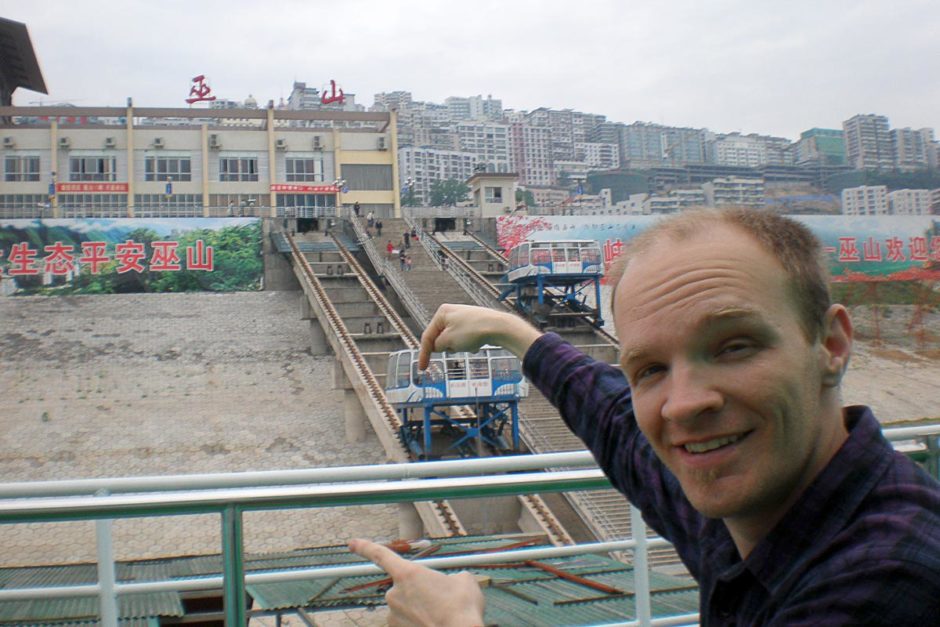
Fengdu Ghost City
The next day, feeling rather grungy due to the ragged boat living quarters and the smoggy Chinese skies but profoundly contented with our traveling life, Masayo and I got off the boat with the others at a place called Fengdu to see the Fengdu Ghost City (丰都鬼城). This is a bizarre complex of buildings and displays showing life in Hell. Literally: it’s based on Diyu, the Buddhist version of Hell, and specifically the capital of Diyu, Youdu. (Never thought of Hell as having its own capital city, did you?)
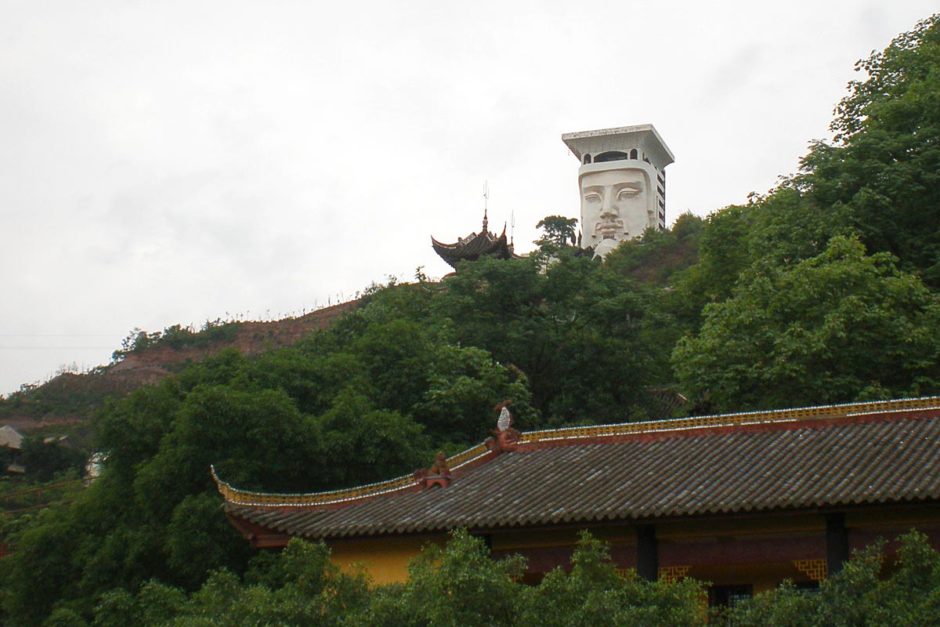
The violent dioramas, with devils cheerfully throwing naked, writing bodies into vats of molten lava, muscular blue devils making sure that Hell’s residents were getting their work done, and blood and missing limbs everywhere, were certainly something to look at.
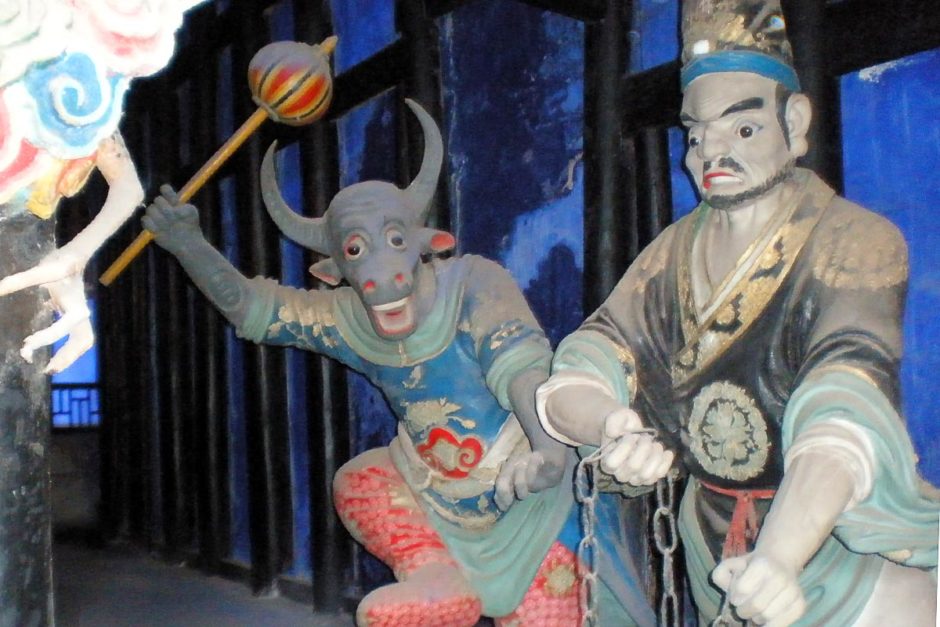
We had met another couple on the boat, on the younger side like us and unlike many of the other tourists. They were very surprised that we had joined this tour despite speaking no Chinese. They and Masayo and I stuck together in the Fengdu Ghost City, strolling among the giant stone statues of horned beasties waving clubs and peering at ghastly dioramas.
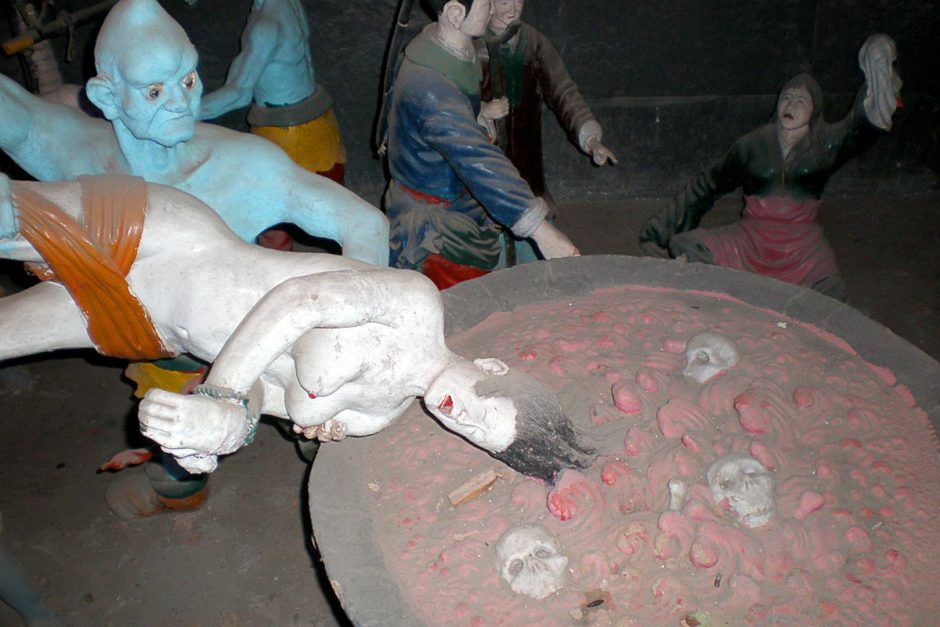
The excursion ended with a little roller coaster ride through the dark – jerking this way and that, Masayo and I would scream with delighted fright when something suddenly jumped out at us. I even tried to get selfies of us at opportune times.
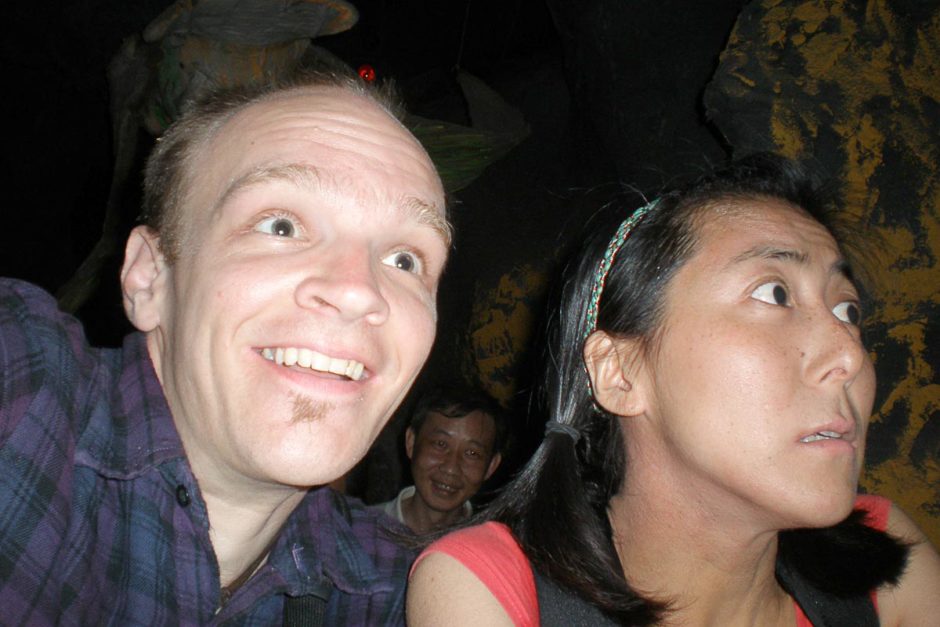
On the roller coaster.
Walking down the big staircase from this final part of the Ghost City, I thought, “Wow, we’ve come a long way. How many people get to say they took a roller coaster through Hell on the banks of the Yangtze River?” It’s these moments of consideration that make the accomplishments of travel so rewarding.
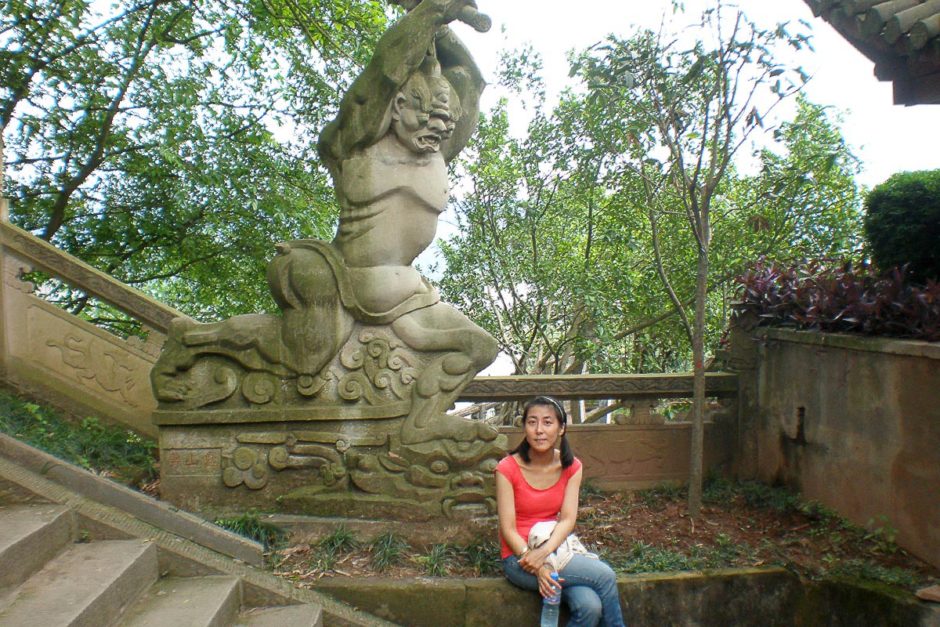
The end of the cruise
That night on the boat was the final night. Masayo and I ended up in the lounge where a karaoke machine was set up. A few Chinese people sung traditional overwrought, emotional Chinese pop songs, and then someone handed the mic to me and encouraged me to sing. I tried, but could not, get out of it. The English song selection wasn’t extensive, and I ended up singing a Christmas song. (Remember, it’s May.) They also had “Lemon Tree” but in Chinese, so Masayo and I tried to remember whatever English words we could.
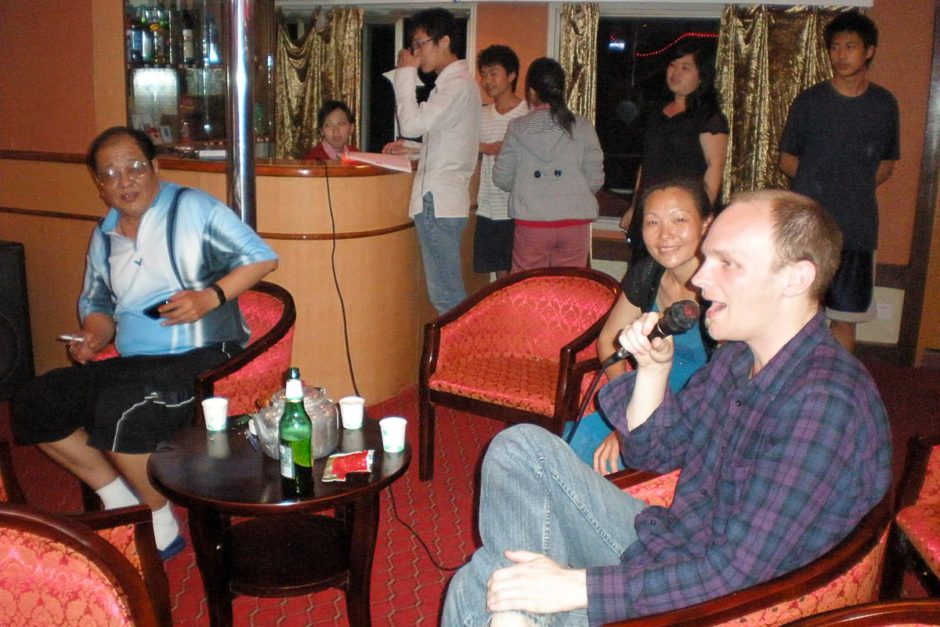
One more night in the dingy little bunk room, and our ragtag Yangtze River cruise came to an end in the gigantic and grey polluted city of Chongqing. In the morning, we took final photos with our new friends the young Chinese couple, and with the hardworking woman who was acting as our tour guide, and the two of us trudged up into Chongqing to find lodging and readjust to life on land.
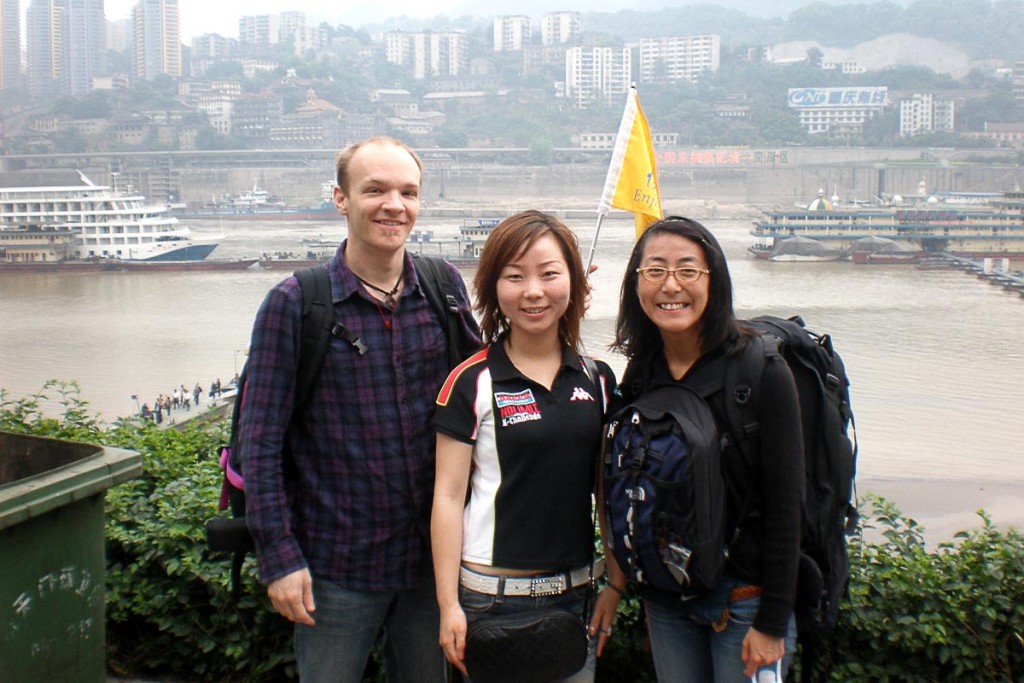
With the tour guide.
What’s the longest you’ve ever spent on water?
Thanks for reading. Suggested:
- Share:
- Read next: Day 68: I left my jaw in Chongqing's hotpot
- News: Newsletter (posted for free on Patreon every week)
- Support: Patreon (watch extended, ad-free videos and get other perks)

Support independent travel content
You can support my work via Patreon. Get early links to new videos, shout-outs in my videos, and other perks for as little as $1/month.
Your support helps me make more videos and bring you travels from interesting and lesser-known places. Join us! See details, perks, and support tiers at patreon.com/t1dwanderer. Thanks!
